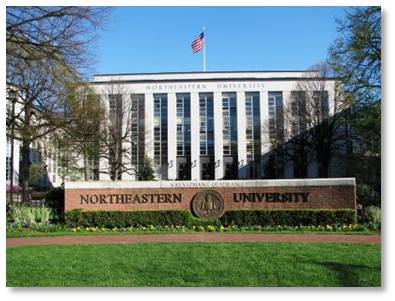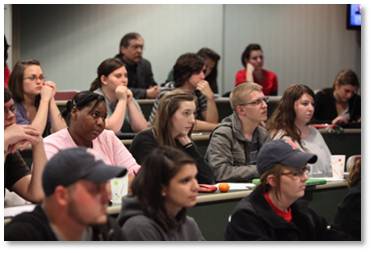The two recent posts about college had me answering these two questions, “What did I really learn in college?” and “Was it worth the money?”
Related Post: Is College Worth the Cost?
Related Post: Majoring in Life: You Want Fries with That?
The second question is easy: yes it was. I got married two weeks after graduation and, while I wanted to get a job, I didn’t really think about a career. Opportunities for women were more circumscribed then than they are now so I didn’t have a lot to think about.
For Men Only
Management training programs, for instance, were for men only. Women need not apply. I didn’t want to be a teacher, a nurse, a secretary, a housewife, or a prostitute—although I did think a lot about flight attendant (or stewardess, as the job was then known) so I could see the world. But early marriage kind of put the kibosh on that idea.
What else was there? I got a job in the Advertising Sales Promotion Department at Dow Jones & Co., Inc., which was then located on Broad Street in Downtown Manhattan. After that, I moved from one job to another and from New York to Boston, getting better titles and salaries until, Expecto Marketus!, I had a career. I have no doubt that the career would have gotten stalled out fairly soon without that all-valuable piece of paper. Also, I would not have gotten on the management track or made such good money over the years.
Ten Lessons in “Real Life 101”
But what did I really learn in my classes? Well, nothing of any value to my career because my Liberal Arts major wasn’t structured that way. Everything I learned in college that helped me on the job took place outside of the classroom. Here are ten of those lessons:
 How to balance my time.
How to balance my time.- How to get along with difficult people.
- How to adjust to people who weren’t like me.
- How to take care of myself and stay safe.
- How to figure out who I was as opposed to who my parents were.
- How to work hard.
- How to deal with an unexpected crisis.
- How to overcome obstacles.
- How to value my talents, abilities, and intelligence.
- How to stand up for what I believed in.
I could easily write a post about each one of these but today I’ll focus on the first one.
Balancing My Time
Every college student quickly learns the range of effort that different students are willing to put into their education. At one end is the Grind (All work and no play makes Jack a dull boy) who studies constantly and is intolerant of his or her roomie’s downtime and friends.
The Grind doesn’t go to movies or parties and spends pretty much all of her time in her room with her nose in a book or computer. Or he’s in the library, using its study resources. Grinds earn good grades but those outside-the-classroom lessons go right over their heads.
The Party Guy
At the other end is the Party Guy (or Party Girl). He spends most of his time goofing around, drinking, going to parties, talking, texting, playing sports and otherwise blowing off academic responsibilities. She doesn’t start studying (or even reading the book) until the night before an exam. Papers are done in “all nighters’ with First Draft, Second Draft and Final Copy crammed into one. PG’s learn a lot of the outside-the classroom lessons, sometimes the hard way, but have a tendency to land in Academic Probation or flunk out altogether.
Fitting on the Spectrum
Most students, though, fit somewhere along a spectrum that ranges from Party Guy to Grind. There’s study time and there’s fun time and the student emerges from the Commencement ceremony with knowledge of the major subject balanced with some street smarts about how to get along in the world.
In my case, and that of many other Northeastern University students of the day, I had to balance my time three ways: academics, fun, and work. After my freshman year, the cost of school was up to me. NU’s full-tuition scholarship only covered that first year and my father paid for room and board for that same period but nothing after that. I think he expected me to drop out or something. So I used @Northeastern’s co-op program to earn money during work semesters. In academic semesters, I combined work-study jobs, part-time jobs, and typing papers for other students to put together every dollar I could find.
The Work Grind
My friends went out to eat, took ski trips, bought clothes, went to the theater and to movies, and otherwise enjoyed themselves. I worked and I saved—a Work Grind kind of experience. I went to parties because those were free—along with the drinks—and took advantage of any opportunities that didn’t require spending money. I walked everywhere in Boston to save the cost of riding the T. I may be the only college student who lost 10 pounds in her freshman year. And it was great experience for my current gig as a docent for Boston by Foot.
I ate all my meals in the dorm because the meal plan covered them. I wore clothes from high school unless someone gave me something new for Christmas or my birthday. If I got to the theater or movies, it was on a date where I didn’t have to pay for tickets.
My most valuable possession with a press pass to the Museum of Fine Arts that I got from my co-op job as a reporter for The Fall River Herald News. It meant I could walk three blocks down Huntington Avenue to @mfa and get in by waving it. I envied my friends who went off, laughing, for ski weekends in Vermont or vacations to the Caribbean with their parents. I did manage a Spring Break in Florida with three of my friends when I got a refund on my taxes and splurged on student airfare instead of socking it in the bank. I learned some lessons there, too.
Lessons in “Real Life 101”
Northeastern’s a five-year school because of the co-op program and I graduated on schedule with a 3.6 GPA so I clearly balanced my time well. Paying my way through school caused me to value my education more than did those kids whose parents wrote the check—but it was a lot more stress and a lot less fun than I think college should be. We paid for our kids to go because I didn’t want them to have that same constant worry about where the next semester’s tuition was going to come from.
None of that learning happened in the classroom but it was a great lesson in “Real Life 101”—for better or for worse. And it got me off to a good start with “Work Ethic 101” when I landed my first job with @DowJones. It also helped me to balance my time between work and family in the demanding technology industry, where employees are often expected to act like computers. There were a lot of things I didn’t know at 22 but I sure knew how to work while still having a family, and I kept right on working until two years ago.
Was it worth the money and the effort? You bet! I can’t imagine what my life would have been like had I not gone to college. It would be a lot smaller and a whole lot less interesting, that’s for sure.



